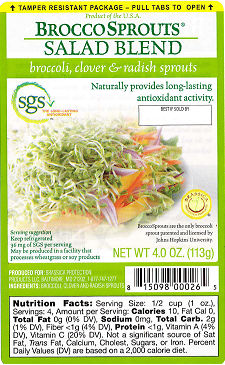The secret to keeping sprouts free of foodborne pathogens lies in industry’s intense attention to cleanliness of seeds.
"Once seeds have germinated, it’s too late. Sprouts are extremely complex structures with a forest-like root system that conceals microorganisms. Just a few E. coli cells can grow to a substantial population during germination and sprouting, and it’s very difficult to get rid of them .jpg) all," said Hao Feng, a University of Illinois associate professor of food and bioprocess engineering.
all," said Hao Feng, a University of Illinois associate professor of food and bioprocess engineering.
Feng’s study is the cover story of the August 2011 issue of the Journal of Food Science. Two other papers that detail his work with sprouts will appear in upcoming issue of that journal and in the Journal of Food Protection.
In his experiments, Feng used both the FDA-recommended dose of chlorine to kill microorganisms and a new sanitizer that was a combination of surfactant and organic acid. He used a laser-scanning confocal microscope to look at micro-slices of seeds, then employed computer software to get a three-dimensional view of their surface structure. This allowed him to calculate each seed’s surface roughness.
Although E. coli could be eliminated on the alfalfa seeds because of their relatively smooth surface, broccoli and radish seeds have rough surfaces. Their texture renders these rougher seeds more susceptible to the attachment of pathogens and makes these microorganisms very difficult to remove, he said.
Feng assured consumers that sprouts are carefully tested for the presence of pathogens. "When there is one positive result, the entire batch is thrown out," he said.
Feng said this research demonstrates the importance of eliminating all pathogens on seeds before .jpg) sprouting.
sprouting.
"The food industry must maintain very strict control in the sprout production process, focusing on the cleanliness of seeds and expending money and effort on prevention. Then consumers can be assured that these nutritious food products are safe to eat," Feng said.
But with no food safety marketing at retail, how do consumers know which sprouts came from safe(erer) seeds?
![]() us we are here to serve them and those who vote for them. Onward an upward! Peace, jimmy.”
us we are here to serve them and those who vote for them. Onward an upward! Peace, jimmy.”
.jpg) outbreaks if Jimmy John’s switched.
outbreaks if Jimmy John’s switched.
.jpg) can be done to ensure the seeds are safe. I wouldn’t be surprised if the next outbreak is even bigger.”
can be done to ensure the seeds are safe. I wouldn’t be surprised if the next outbreak is even bigger.”.jpg) positive for Listeria monocytogenes.
positive for Listeria monocytogenes. • &Green Valley Food Corp. Spicy Sprouts 4 oz. plastic security sealed clamshell containers with the UPC number 815098002023
• &Green Valley Food Corp. Spicy Sprouts 4 oz. plastic security sealed clamshell containers with the UPC number 815098002023.jpg) were misleading.
were misleading. to ensure the integrity of grain and plant exports.
to ensure the integrity of grain and plant exports..jpg) outbreak associated with raw sprouts centered in Germany earlier this year.
outbreak associated with raw sprouts centered in Germany earlier this year..jpg) all," said
all," said .jpg) sprouting.
sprouting..jpg) them acceptable.
them acceptable.